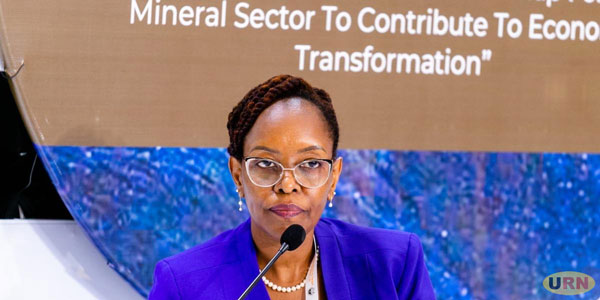
Kampala, Uganda | THE INDEPENDENT | The Extractive Industries Transparency Initiative (EITI) says Uganda has improved transparency and accountability in its oil and mining sector.
In the latest findings, the EITI, a global standard for the prudent management of natural resources, hails Uganda for establishing what it described as a robust multi-stakeholder platform and undertaking reforms to its Minerals Act. Uganda recently enacted the Mining And Mineral Act 2023 ushering in some of the aspects that promote transparency.
The EITI Board concluded that Uganda has achieved a moderate overall score (78.5 points) in EITI implementation.
“I commend Uganda for establishing a robust multi-stakeholder platform that facilitates public engagement and data-driven debate,” EITI Board Chair Helen Clark said.
However, the board said further efforts are needed to disclose contracts and beneficial owners and to ensure that civil society can freely participate in the EITI process.
“Building on a strong foundation for sector governance, stakeholders should prioritize concrete measures to disclose oil, gas, and mining agreements and beneficial ownership information. Safeguarding the broader civic space will be crucial to sustain transparent and accountable governance of natural resources in Uganda.”
Uganda joined the EITI in 2020 to leverage transparency to enhance public trust, improve the investment climate, and strengthen revenue collection.
As an emerging oil producer, Uganda holds significant petroleum reserves and plans to begin oil production in 2025.
The East African Crude Oil Pipeline (EACOP), currently under construction, is poised to transport 6,000 barrels of oil per day from Uganda’s Albertine Graben to Tanzania’s Tanga port, promising substantial revenue streams for Uganda.
Two oil fields at CNOOC’s King Fisher and TotalEnergies’ Tilenga projects commenced drilling exercise ahead of the planned first oil 2025. Uganda established its EITI secretariat known as UGEITI under the Ministry of Finance. UGEITI has a Multi-Stakeholder Group(MSG) chaired by the current Director of Economic Affairs, Moses Kagwa.
The Multi-Stakeholder Group has membership from civil society, government bodies like URA, the Bank of Uganda, the National Planning Authority, the Ministry of Energy, the Ministry of Justice and Constitutional Affairs, and the Ministry of Water and the Environment among others.
Why are contracts Still Confidential?
Some of the oil and gas companies have indicated that they are willing to have the contracts signed with the government disclosed.
However, Saul Ongaria, the National Coordinator of Uganda Extractive Industries Transparency Initiative (UGEITI) told Uganda Radio Network there is an ongoing discussion with the oil and mining companies about the matter.
He said the disclosure aspect is a process. Some of the contracts like the production sharing agreements were signed before Uganda joined EITI.
The PSAs still contain confidentiality clauses. Ongaria said the contract disclosure has to be done fairly and in an orderly manner.
Uganda still has to work hard to ensure that the beneficial owners of oil and mining companies are disclosed. It appears that Uganda has yet to fulfill some of the EITI requirements on beneficial owners of the mining companies as it were in the repealed Mining Act 2003.
According to the EITI secretariat, the real owners of extractive companies, known as the beneficial owners, are often kept anonymous or hidden by a chain of shell companies. It says that can be a particular challenge in the extractive industries, where knowing who has the rights to extract oil, gas, and minerals is key to addressing risks of corruption or conflict of interest. EITI says protecting anonymity can deter investment and make it harder to curb corruption.
“It is estimated that developing countries have lost USD 1 trillion a year since 2011 as a result of corrupt or illegal deals, many of which involve anonymous companies. Investigations using beneficial ownership information culminated in data leaks such as the Panama Papers, the Luanda Leaks, and the Pandora Papers,” it says.
The EITI said it has been able to deliver practical results through the inclusion of beneficial ownership information in licensing and company registration processes as well as through EITI reporting.
“Publishing details of company ownership can help close channels for corruption, enable effective taxation, build fairer markets, encourage responsible investment, and manage business risk. Addressing these issues will remain critical as the energy transition gathers pace,” A UGEITI report states.

Setting the stage
In recent years, Uganda has instituted robust frameworks to manage its anticipated oil wealth and bolster the mining sector’s prospects. The passage of the 2022 Mining and Minerals Act marked a significant milestone, paving the way for enhanced governance and transparency in the sector.
The establishment of Uganda’s EITI multi-stakeholder group (UGEITI) has played a pivotal role in enhancing public oversight and governance within the extractive sector.
Using the EITI platform, the government has been addressing key issues such as Minerals Act reforms and beneficial ownership disclosure.
Civil society engagement within the multi-stakeholder group and has facilitated extensive public outreach and debate activities, focusing on areas such as contract transparency, beneficial ownership, fiscal justice, and local impact. However, further efforts are needed to ensure that civil society representatives can fully engage in public debate on the EITI process and express their opinions without restraint, coercion or reprisal.
Shining a light
Amid heightened public expectations and concerns, particularly regarding petroleum development, the EITI process has served as a vital diagnostic tool for assessing information and extractive governance practices within Uganda’s extractive sector.
EITI reporting has provided valuable insights on the fiscal benefits derived from oil, gas and mining activities, including how revenues are allocated at the sub national level.
Additionally, the EITI has fostered discussions on the environmental impacts of EACOP, enabling disclosures on social and environmental impacts and contributions of extractive projects, which can address concerns raised by civil society. Moving forward Despite notable progress, there are opportunities for UGEITI to enhance transparency in areas such as gold refining and trade.
Uganda’s can further advance transparency by fully disclosing oil, gas and mining contracts, building on broad industry support to publish extractive agreements.
It can also take steps to disclose the ultimate owners of extractive rights and companies, which will help close avenues for corruption and conflicts of interest. With anticipated first oil exports in 2025, these steps will be imperative to build upon the foundation of transparency and ensure Uganda’s extractive sector is managed in the interest of its citizens.
****
URN
 The Independent Uganda: You get the Truth we Pay the Price
The Independent Uganda: You get the Truth we Pay the Price


